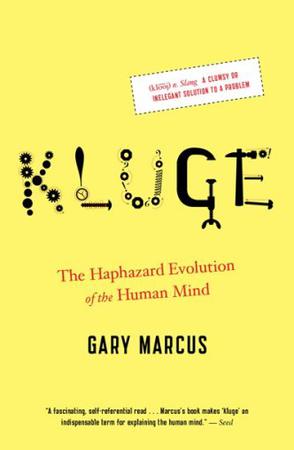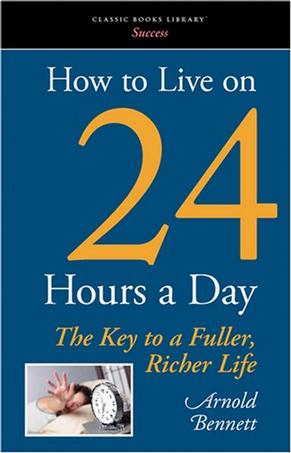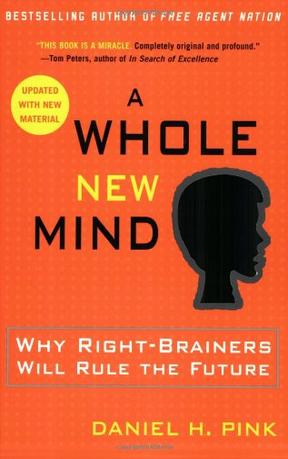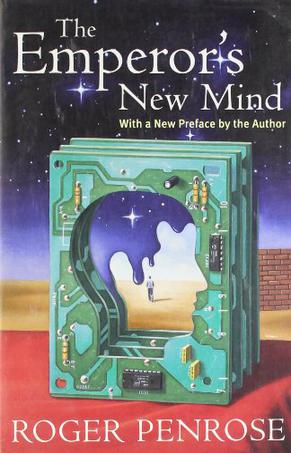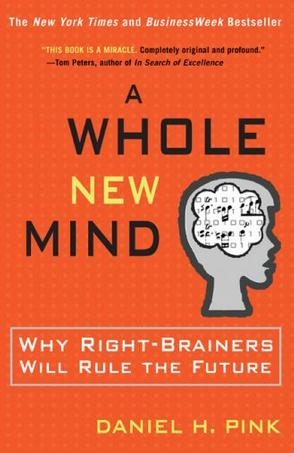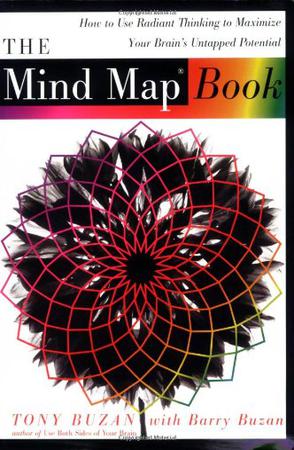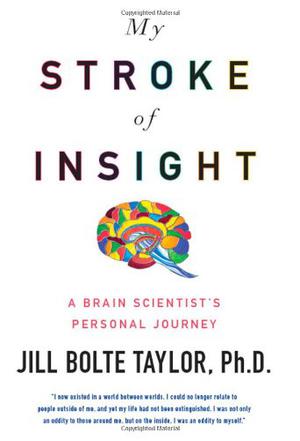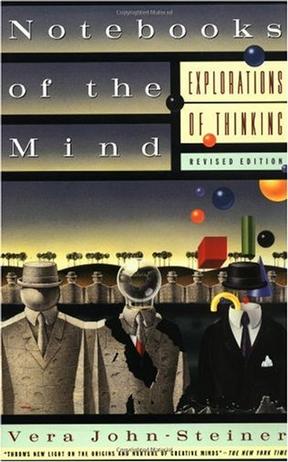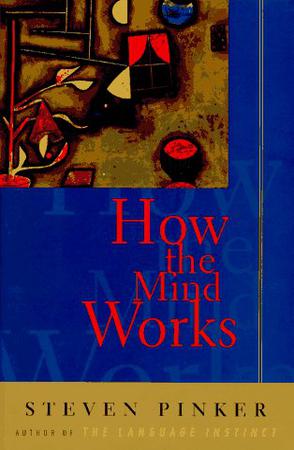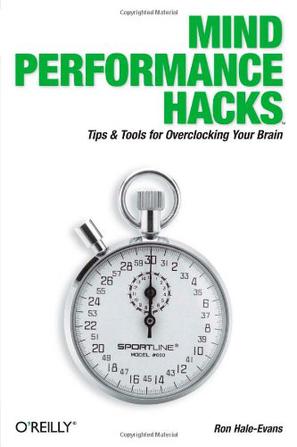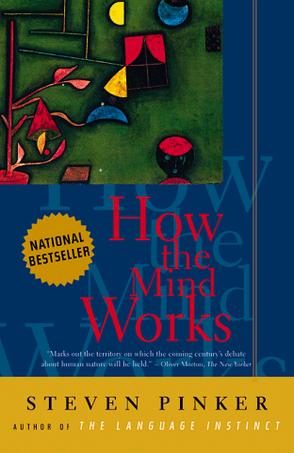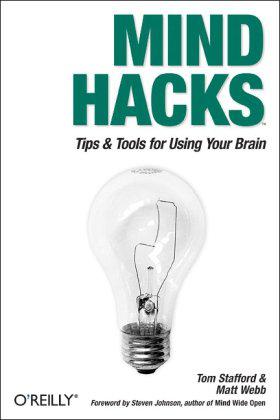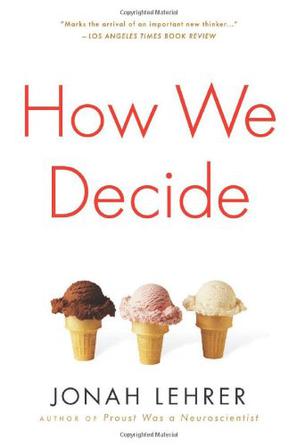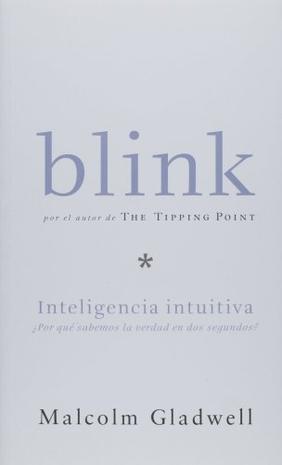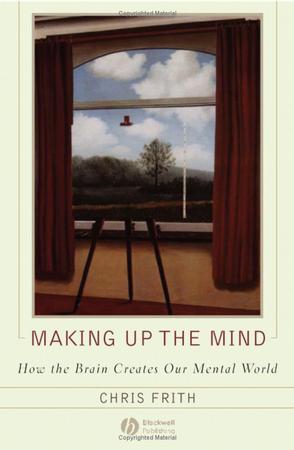欢迎来到相识电子书!
标签:mind
-
Kluge
How is it that we can recognize photos from our high school yearbook decades later, but cannot remember what we ate for breakfast yesterday? And why are we inclined to buy more cans of soup if the sign says "LIMIT 12 PER CUSTOMER" rather than "LIMIT 4 PER CUSTOMER?" In "Kluge, "Gary Marcus argues convincingly that our minds are not as elegantly designed as we may believe. The imperfections result from a haphazard evolutionary process that often proceeds by piling new systems on top of old ones--and those systems don't always work well together. The end product is a "kluge," a clumsy, cobbled-together contraption. Taking us on a tour of the essential areas of human experience--memory, belief, decision making, language, and happiness--Marcus unveils a fundamentally new way of looking at the evolution of the human mind and simultaneously sheds light on some of the most mysterious aspects of human nature. -
How to Live on 24 Hours a Day
This classic personal time-management book originally published in 1908 has inspired generations of men and women to live deliberate lives. Not just another collection of time saving tips, this book is more of a challenge to leave behind mundane everyday concerns, focus on pursuing one's true desires, and live the fullest possible life. Reflection, concentration, and study techniques make it easier to accomplish more truly rewarding undertakings than anyone ever dreamed possible. -
A Whole New Mind
在线阅读本书 The future belongs to a different kind of person with a different kind of mind: artists, inventors, storytellers-creative and holistic "right-brain" thinkers whose abilities mark the fault line between who gets ahead and who doesn't. Drawing on research from around the world, Pink outlines the six fundamentally human abilities that are absolute essentials for professional success and personal fulfillment-and reveals how to master them. A Whole New Mind takes readers to a daring new place, and a provocative and necessary new way of thinking about a future that's already here. -
The Emperor's New Mind
In the readition of the bestselling Chaos and A Brief History of Time, here is a science book with mainstream appeal. Proponents of artificial intelligence maintain that eventually a computer will be able to do everything a human mind can do, but Oxford University Professor of Mathematics Roger Penrose explains his view that there are facets of human thinking that can never be emulated by a machine. Drawings throughout. Some love it, some hate it, but The Emperor's New Mind, physicist Roger Penrose's 1989 treatise attacking the foundations of strong artificial intelligence, is crucial for anyone interested in the history of thinking about AI and consciousness. Part survey of modern physics, part exploration of the philosophy of mind, the book is not for casual readers--though it's not overly technical, it rarely pauses to let the reader catch a breath. The overview of relativity and quantum theory, written by a master, is priceless and uncontroversial. The exploration of consciousness and AI, though, is generally considered as resting on shakier ground. Penrose claims that there is an intimate, perhaps unknowable relation between quantum effects and our thinking, and ultimately derives his anti-AI stance from his proposition that some, if not all, of our thinking is non-algorithmic. Of course, these days we believe that there are other avenues to AI than traditional algorithmic programming; while he has been accused of setting up straw robots to knock down, this accusation is unfair. Little was then known about the power of neural networks and behavior-based robotics to simulate (and, some would say, produce) intelligent problem-solving behavior. Whether these tools will lead to strong AI is ultimately a question of belief, not proof, and The Emperor's New Mind offers powerful arguments useful to believer and nonbeliever alike. --Rob Lightner -
A Whole New Mind
Lawyers. Accountants. Radiologists. Software engineers. That's what our parents encouraged us to become when we grew up. But Mom and Dad were wrong. The future belongs to a very different kind of person with a very different kind of mind. The era of "left brain" dominance, and the Information Age that it engendered, are giving way to a new world in which "right brain" qualities-inventiveness, empathy, meaning-predominate. That's the argument at the center of this provocative and original book, which uses the two sides of our brains as a metaphor for understanding the contours of our times. In the tradition of Emotional Intelligence and Now, Discover Your Strengths , Daniel H. Pink offers a fresh look at what it takes to excel. A Whole New Mind reveals the six essential aptitudes on which professional success and personal fulfillment now depend, and includes a series of hands-on exercises culled from experts around the world to help readers sharpen the necessary abilities. This book will change not only how we see the world but how we experience it as well. -
My Stroke of Insight
在线阅读本书 A brain scientist's journey from a debilitating stroke to full recovery becomes an inspiring exploration of human consciousness and its possibilities On the morning of December 10, 1996, Jill Bolte Taylor, a thirty-seven-year-old Harvard-trained brain scientist, experienced a massive stroke when a blood vessel exploded in the left side of her brain. A neuroanatomist by profession, she observed her own mind completely deteriorate to the point that she could not walk, talk, read, write, or recall any of her life, all within the space of four brief hours. As the damaged left side of her brain--the rational, grounded, detail- and time-oriented side--swung in and out of function, Taylor alternated between two distinct and opposite realties: the euphoric nirvana of the intuitive and kinesthetic right brain, in which she felt a sense of complete well-being and peace; and the logical, sequential left brain, which recognized Jill was having a stroke, and enabled her to seek help before she was lost completely. In My Stroke of Insight , Taylor shares her unique perspective on the brain and its capacity for recovery, and the sense of omniscient understanding she gained from this unusual and inspiring voyage out of the abyss of a wounded brain. It would take eight years for Taylor to heal completely. Because of her knowledge of how the brain works, her respect for the cells composing her human form, and most of all an amazing mother, Taylor completely repaired her mind and recalibrated her understanding of the world according to the insights gained from her right brain that morning of December 10th. Today Taylor is convinced that the stroke was the best thing that could have happened to her. It has taught her that the feeling of nirvana is never more than a mere thought away. By stepping to the right of our left brains , we can all uncover the feelings of well-being and peace that are so often sidelined by our own brain chatter. A fascinating journey into the mechanics of the human mind, My Stroke of Insight is both a valuable recovery guide for anyone touched by a brain injury, and an emotionally stirring testimony that deep internal peace truly is accessible to anyone, at any time. Questions for Jill Bolte Taylor Amazon.com: Your first reaction when you realized what was happening to your body was one you would expect: "Oh my gosh, I'm having a stroke!" Your second, though, was a little more surprising: "Wow, this is so cool!" What could be cool about a stroke? Taylor: I grew up to study the brain because I have a brother who is only 18 months older than I am. He was very different in the way he perceived experiences and then chose to behave. As a result, I became fascinated with the human brain and how it creates our perception of reality. He was eventually diagnosed with the brain disorder schizophrenia, and I dedicated my career to the postmortem investigation of the human brain in an attempt to understand, at a biological level, what are the differences between my brain and my brothers brain. On the morning of the stroke, I realized that my brain was no longer functioning like a "normal" brain and this insight into my brother's reality excited me. I was fascinated to intimately understand what it might be like on the inside for someone who would not be diagnosed as normal. Through the eyes of a curious scientist, this was an absolutely rare and fascinating experience for me to witness the breakdown of my own mind. Amazon.com: What did you learn about the brain from your stroke and your recovery that your scientific training hadn't prepared you for? Taylor: My scientific training did not teach me anything about the human spirit and the value of compassion. I had been trained as a scientist, not as a clinician. I can only hope that we are teaching our future physicians about compassion in medicine, and I know that some medical schools, including the Indiana University School of Medicine, have created a curriculum with this intention. My training as a scientist, however, did provide me with a roadmap to how the body and brain work. And although I lost my left cognitive mind that thinks in language, I retained my right hemisphere that thinks in pictures. As a result, although I could not communicate with the external world, I had an intuitive understanding about what I needed to do in order to create an environment in which the cells in my brain could be happy and healthy enough that they could regain their function. In addition, because of my training, I had an innate trust in the ability of my brain to be able to recover itself and my mother and I respected the organ by listening to it. For example, when I was tired, I allowed my brain to sleep, and when I was fresh and capable of focusing my attention, we gave me age-appropriate toys and tools with which to work. Amazon.com: Your stroke affected functions in your left brain, leaving you to what you call the "la-la land" of your right hemisphere. What was it like to live in your right brain, and then to rebuild your left? Taylor: When the cells in my left brain became nonfunctional because they were swimming in a pool of blood, they lost their ability to inhibit the cells in my right hemisphere. In my right brain, I shifted into the consciousness of the present moment. I was in the right here, right now awareness, with no memories of my past and no perception of the future. The beauty of La-la land (my right hemisphere experience of the present moment) was that everything was an explosion of magnificent stimulation and I dwelled in a space of euphoria. This is great way to exist if you don't have to communicate with the external world or care whether or not you have the capacity to learn. I found that in order for me to be able to learn anything, however, I had to take information from the last moment and apply it to the present moment. When my left hemisphere was completely nonfunctional early on, it was impossible for me to learn, which was okay with me, but I am sure it was frustrating for those around me. A simple example of this was trying to put on my shoes and socks. I eventually became physically capable of putting my shoes and socks on, but I had no ability to understand why I would have to put my socks on before my shoes. To me they were simply independent actions that were not related and I did not have the cognitive ability to figure out the appropriate sequencing of the events. Over time, I regained the ability to weave moments back together to create an expanse of time, and with this ability came the ability to learn methodically again. Life in La-la land will always be just a thought away, but I am truly grateful for the ability to think with linearity once again. Amazon.com: What can we learn about our brains and ourselves from your experience, even if we haven't lived through the kind of brain trauma you have? Taylor: I learned that I have much more say about what goes on between my ears than I was ever taught and I believe that this is true for all of us. I used to understand that I had the ability to stop thinking about one thing by consciously choosing to preoccupy my mind with thinking about something else. But I had no idea that it only took 90 seconds for me to have an emotional circuit triggered, flush a physiological response through my body and then flush completely out of me. We can all learn that we can take full responsibility for what thoughts we are thinking and what emotional circuitry we are feeling. Knowing this and acting on this can lead us into feeling a wonderful sense of well-being and peacefulness. Amazon.com: You are the "Singin' Scientist" for Harvard's Brain Bank (just as you were before your stroke). Could you tell us about the Brain Bank (in song or not)? Taylor: There is a long-term shortage of brain tissue donated for research into the severe mental illnesses. Most people dont realize that when you sign the back of your license as an organ donor, the brain is not included. If you would like to donate your brain for research, you must contact a brain bank directly. There is also a shortage of "normal control" tissue for research. The bottom line reality is that if there were more tissue available for research, then more scientists would be dedicating their careers to the study of the severe mental illnesses and we would have more answers about what is going on with these disorders. The numbers of mentally ill individuals in our society are staggering. The most serious and disabling conditions affect about 6 percent--or one in 17--adults and 9-13 percent of children in the United States. Half of all lifetime conditions of mental illness start by age 14 years, and three-fourths by age 24 years. For more information about brain donation to the Harvard brain bank, please call 1-800-BRAINBANK or visit them at: www.brainbank.mclean.org If you would like to hear me sing the brain bank jingle, please visit www.drjilltaylor.com! -
Notebooks of the Mind
How do creative people think? Do great works of the imagination originate in words or in images? Is there a rational explanation for the sudden appearance of geniuses like Mozart or Einstein? Such questions have fascinated people for centuries; only in recent years, however, has cognitive psychology been able to provide some clues to the mysterious process of creativity. In this revised edition of Notebooks of the Mind, Vera John-Steiner combines imaginative insight with scientific precision to produce a startling account of the human mind working at its highest potential. To approach her subject John-Steiner goes directly to the source, assembling the thoughts of "experienced thinkers"--artists, philosophers, writers, and scientists able to reflect on their own imaginative patterns. More than fifty interviews (with figures ranging from Jessica Mitford to Aaron Copland), along with excerpts from the diaries, letters, and autobiographies of such gifted giants as Leo Tolstoy, Marie Curie, and Diego Rivera, among others, provide illuminating insights into creative activity. We read, for example, of Darwin's preoccupation with the image of nature as a branched tree while working on his concept of evolution. Mozart testifies to the vital influence on his mature art of the wondrous "bag of memories" he retained from childhood. Anais Nin describes her sense of words as oppressive, explaining how imagistic free association freed her as a writer. Adding these personal accounts to laboratory studies of thought process, John-Steiner takes a refreshingly holistic approach to the question of creativity. What emerges is an intriguing demonstration of how specific socio-cultural circumstances interact with certain personality traits to encourage the creative mind. Among the topics examined here are the importance of childhood mentor figures; the lengthy apprenticeship of the talented person; and the development of self- expression through highly individualistic languages, whether in images, movement or inner speech. Now, with a new introduction, this award-winning book provides an uniquely broad-based study of the origins, development and fruits of human inspiration. -
Mind Performance Hacks
You're smart. This book can make you smarter. Mind Performance Hacks provides real-life tips and tools for overclocking your brain and becoming a better thinker. In the increasingly frenetic pace of today's information economy, managing your life requires hacking your brain. With this book, you'll cut through the clutter and tune up your brain intentionally, safely, and productively. Grounded in current research and theory, but offering practical solutions you can apply immediately, Mind Performance Hacks is filled with life hacks that teach you to: * Use mnemonic tricks to remember numbers, names, dates, and other flotsam you need to recall * Put down your calculator and perform complex math in your head, with your fingers, or on the back of a napkin * Spark your creativity with innovative brainstorming methods * Use effective systems to capture new ideas before they get away * Communicate in creative new ways-even using artificial languages * Make better decisions by foreseeing problems and finding surprising solutions * Improve your mental fitness with cool tricks and games While the hugely successful Mind Hacks showed you how your brain works, Mind Performance Hacks shows you how to make it work better. -
How the Mind Works
In this extraordinary bestseller, Steven Pinker, one of the world's leading cognitive scientists, does for the rest of the mind what he did for language in his 1994 book, The Language Instinct. He explains what the mind is, how it evolved, and how it allows us to see, think, feel, laugh, interact, enjoy the arts, and ponder the mysteries of life. And he does it with the wit that prompted Mark Ridley to write in the New York Times Book Review, "No other science writer makes me laugh so much. . . . [Pinker] deserves the superlatives that are lavished on him." The arguments in the book are as bold as its title. Pinker rehabilitates some unfashionable ideas, such as that the mind is a computer and that human nature was shaped by natural selection, and challenges fashionable ones, such as that passionate emotions are irrational, that parents socialize their children, and that nature is good and modern society corrupting. -
Mind Hacks
This exploration into the moment-by-moment works of the brain uses cognitive neuroscience to present experiments, tricks, and tips related to vision, motor skills, attention, cognition, subliminal perception. Each "hack" examines specific operations of the brain. By seeing how the brain responds, you'll learn more about how the brain is put together. If you want to find out what's going on in your head, then Mind Hacks is the key. -
How We Decide
Product Description The first book to use the unexpected discoveries of neuroscience to help us make the best decisions. Since Plato, philosophers have described the decision-making process as either rational or emotional: we carefully deliberate, or we blink and go with our gut. But as scientists break open the mind's black box with the latest tools of neuroscience, they re discovering that this is not how the mind works. Our best decisions are a finely tuned blend of both feeling and reason and the precise mix depends on the situation. When buying a house, for example, it s best to let our unconscious mull over the many variables. But when we re picking a stock, intuition often leads us astray. The trick is to determine when to use the different parts of the brain, and to do this, we need to think harder (and smarter) about how we think. Jonah Lehrer arms us with the tools we need, drawing on cutting-edge research as well as the real-world experiences of a wide range of deciders from airplane pilots and hedge fund investors to serial killers and poker players. Lehrer shows how people are taking advantage of the new science to make better television shows, win more football games, and improve military intelligence. His goal is to answer two questions that are of interest to just about anyone, from CEOs to firefighters: How does the human mind make decisions? And how can we make those decisions better? -
Making Up The Mind - How The Brain Creates Our Mental World
Inside your head there is an amazing labor saving device; more effective than the latest high-tech computer. Your brain frees you from the everyday tasks of moving about in the world around you, allowing you to concentrate on the things that are important to you; making friends and influencing people. However, the 'you' that is released into this social world is also a construction of your brain. It is your brain that enables you to share your mental life with the people around you. Making Up the Mind is the first accessible account of experimental studies showing how the brain creates our mental world. Using evidence from brain imaging, psychological experiments, and patient studies, Chris Frith, one of the world's leading neuroscientists, explores the relationship between the mind and the brain.
热门标签
下载排行榜
- 1 梦的解析:最佳译本
- 2 李鸿章全传
- 3 淡定的智慧
- 4 心理操控术
- 5 哈佛口才课
- 6 俗世奇人
- 7 日瓦戈医生
- 8 笑死你的逻辑学
- 9 历史老师没教过的历史
- 10 1分钟和陌生人成为朋友

